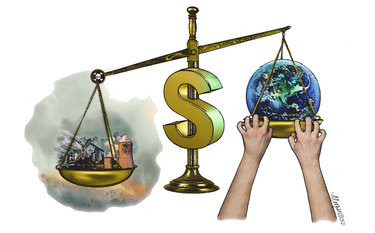If you’re not reading this on your rooftop, there might still be time
Rising global temperatures are fueling extreme weather throughout the world, impacting economies and societies, according to a recent United Nations report. Any of us who read or watch the news have seen the effects around the world and close to home, from floods to fires.
Climate change is widespread, rapid, and intensifying, according to the latest scientific report from the Intergovernmental Panel on Climate Change.
The panel has found changes in the Earth’s climate in every region and across the whole climate system. Many changes are unprecedented in thousands, if not hundreds of thousands, of years. Some, such as continued sea-level rise, are irreversible over hundreds to thousands of years.
The report points to strong and sustained reductions in emissions of carbon dioxide and other greenhouse gases to limit climate change. Benefits for air quality would come quickly, while global temperatures would take 20 to 30 years to stabilize.
We should have acted long ago to reduce greenhouse gases but at least now our federal government is moving in the right direction. Last Thursday, the White House released beginning plans from 23 federal agencies for coping with climate change.
This work, which started under the Obama administration, was abandoned under Trump but is moving forward under the Biden administration. The reports make clear that every facet of our lives from our food supply to our safety could be affected.
Water shortages could raise international tensions, masses of climate refugees could try to find safety here, radioactive waste could be loosed by climate hazards, our mobility could become limited as asphalt degrades and tunnels flood, more wildfires and floods along with pests and disease could reduce our food supply — these are just some of the problems outlined in the federal agencies’ reports.
At the state level, New York has set a goal to reduce greenhouse gas emissions by 80 percent below the levels emitted in 1990 by the year 2050.
Stemming climate change must be a worldwide effort, a national effort, a state effort — and a local effort.
We were gratified this past week to report on Albany County receiving a Bronze designation as part of the state’s Climate Smart program. The county completed 30 actions items for a total of 176 points to achieve this designation.
Albany County earned points for partnering with others; inventorying its greenhouse gases; decreasing its energy use with new lighting; tracking energy use; purchasing hybrid vehicles; adopting an environmental purchasing policy; installing a solar-energy system and encouraging others to; educating residents about waste reduction and recycling; expanding biking and walking paths; installing charging stations; planning for handling floods, droughts, and heat waves; conserving natural areas; managing stormwater; selling rain barrels to the public; encouraging water-smart landscaping; adopting a plan to promote green industries; pitching a shop-local plan; creating a sustainable-energy loan program; creating a website on the county’s climate change adaptations — the list goes on.
You can see that the initiatives here are both big and small. We’ve listed them in hopes of inspiring our towns and villages to do the same.
Three of the towns we cover have already taken the important step of passing a resolution to become a Climate Smart Community under the program administered by the state’s Department of Environmental Conservation.
Knox made the pledge in October 2015 with Amy Pokorny, a former town board member, as the primary contact. New Scotland made the pledge in June 2018 under Supervisor Doug LaGrange and Guilderland made the pledge in August 2019 under Supervisor Peter Barber.
We commend these towns for taking that essential first step and we encourage the other towns we cover to do the same.
But now action is needed.
The state outlines some practical advantages to governments participating in the program — a gateway to grants; a chance to share best practices with peers; and streamlined access to resources, training, tools, and expert guidance.
But more important are the benefits to the communities those governments serve: Air quality is improved; residents who have a chance to walk and bike are healthier; biodiversity increases with green space; future flood risk is reduced; and cost savings for taxpayers are realized through greater efficiencies.
Knox, New Scotland, and Guilderland have already completed the first two steps, passing a resolution and registering for the program. Now they need to select actions to undertake and follow through, documenting their success.
The rewards are far more important than any designation as a Bronze or Silver community.
As the pledge adopted by these towns state, “The effects of climate change will endanger our infrastructure, economy and livelihoods; harm our farms, orchards, ecological communities, and wildlife populations; spread invasive species and exotic diseases; reduce drinking water supplies; and pose health threats to our citizens.”
Our salvation depends on our resilience.
In recent Enterprise forums held ahead of the Nov. 2 elections, we have heard from candidates in Guilderland and Berne of the need for new comprehensive plans for their towns. Environmental health — curbing emissions of greenhouse gases and encouraging a green economy — should be a central tenet of those plans.
For the sake of a sustainable future, each of our towns should incorporate those tenets into their plans.
The resolution that three of our towns have already taken requires inventorying emissions and setting goals for a climate action plan; decreasing energy use and shifting to renewable energy; implementing climate-smart land-use and climate-smart materials management; supporting a green, innovative economy; and informing and inspiring the public.
Already, it will take many future generations to capture the carbon we humans have so heedlessly loosed into our atmosphere. Each of us at every level needs to do our part to preserve human and animal life on this planet.
Local governments are closest to home so we’re calling on local leaders to do just that — lead. We, as individuals, can step up and work with our town governments to make a difference.
This is our moment. Let’s act — using the framework our state has put in place — before it’s too late.



